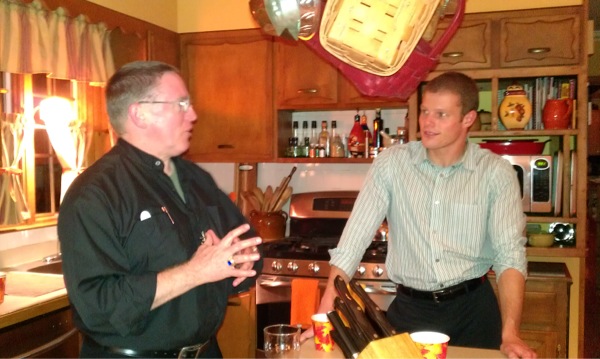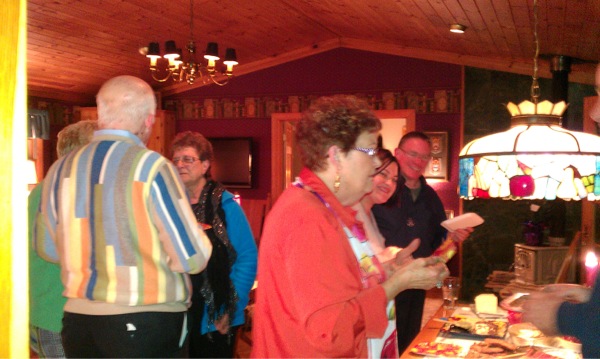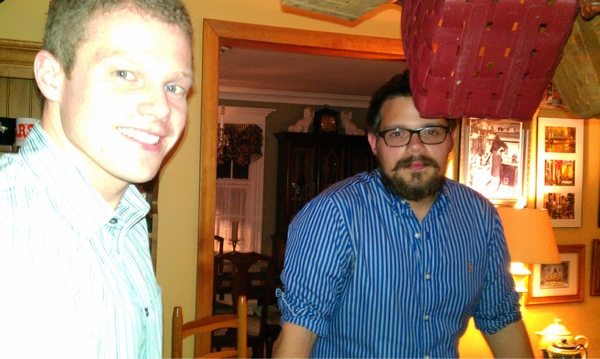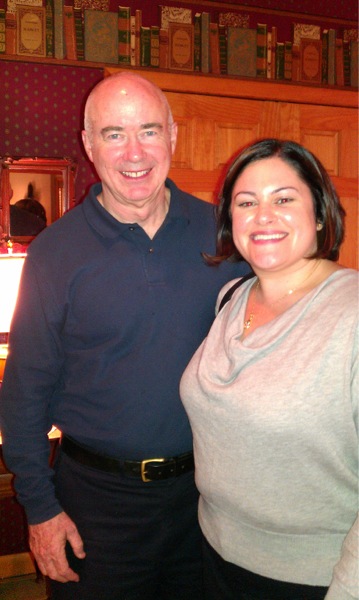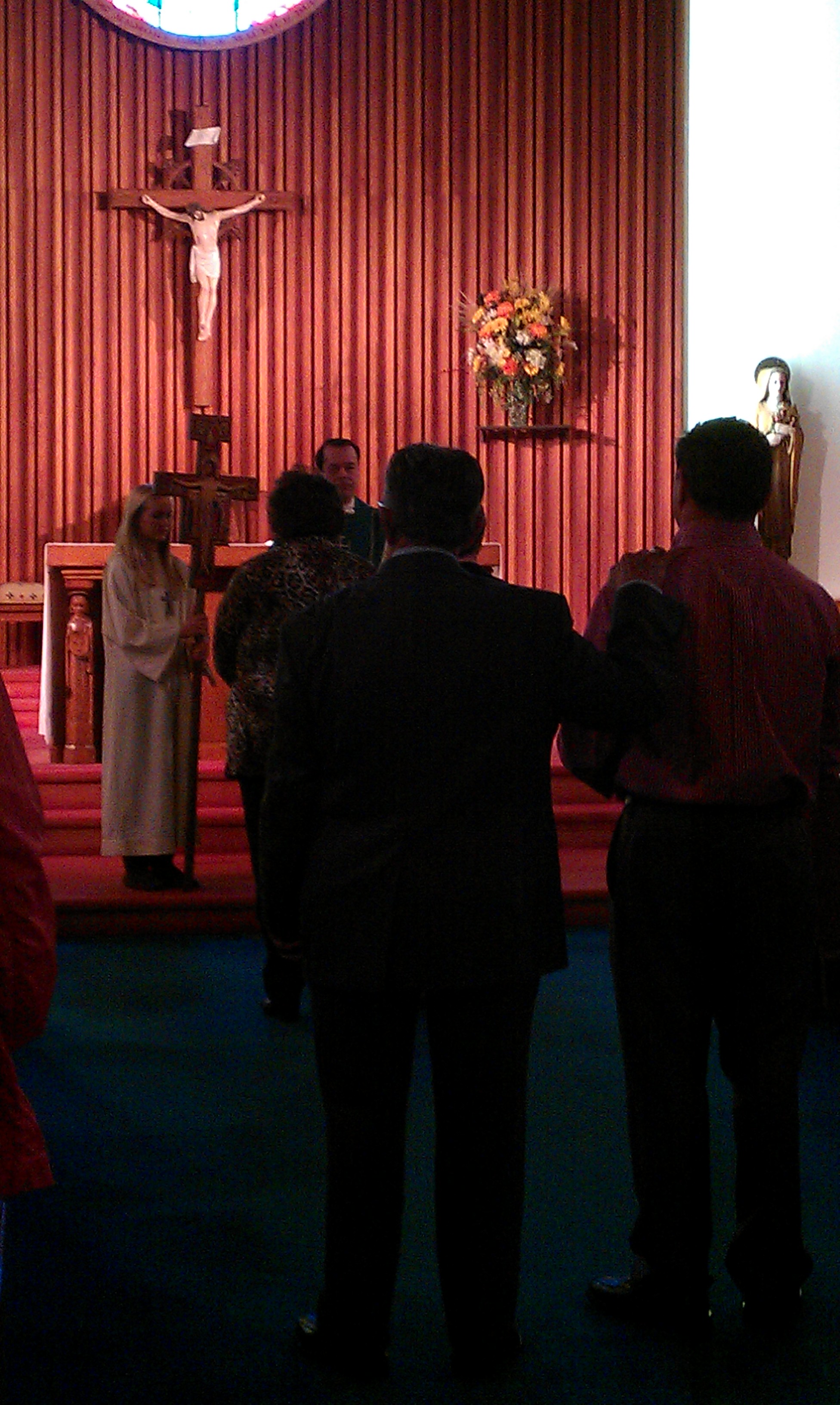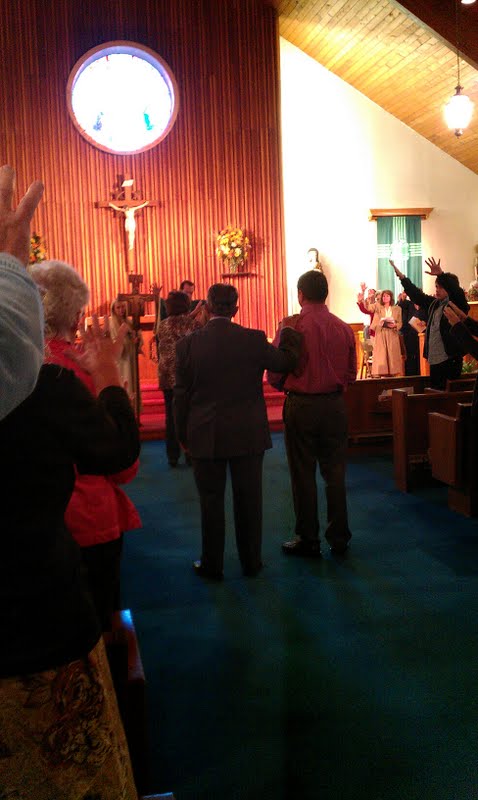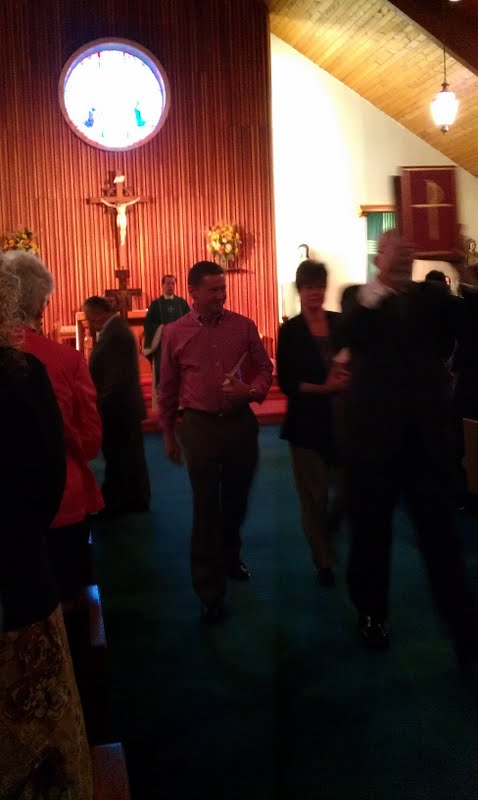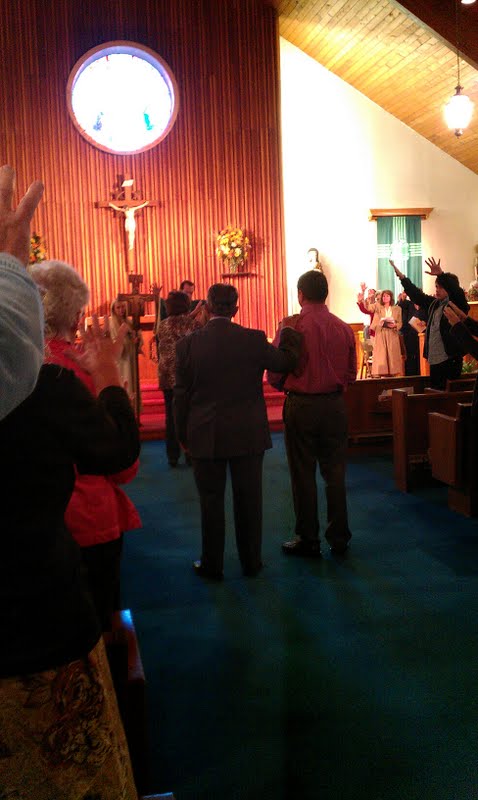Missing in Action: The Rite of Christian Initiation for Adults
"The catechumenate for adults, divided into several distinct steps, is to be restored and brought into use at the discretion of the local Ordinary. By this means, the time of the catechumenate, which is destined for the requisite formation, may be sanctified by sacred rites to be celebrated at successive stages." Sacrosanctum Concilium, 64. 4 December, 1963.
This paragraph from Chapter III of The Constitution on the Sacred Liturgy resulted in the the Rite of Christian Initiation of Adults. 6 January, 1972.
****
Last week, I visited Blessed Trinity Catholic Church in Orlando, Florida with my husband Patrick.
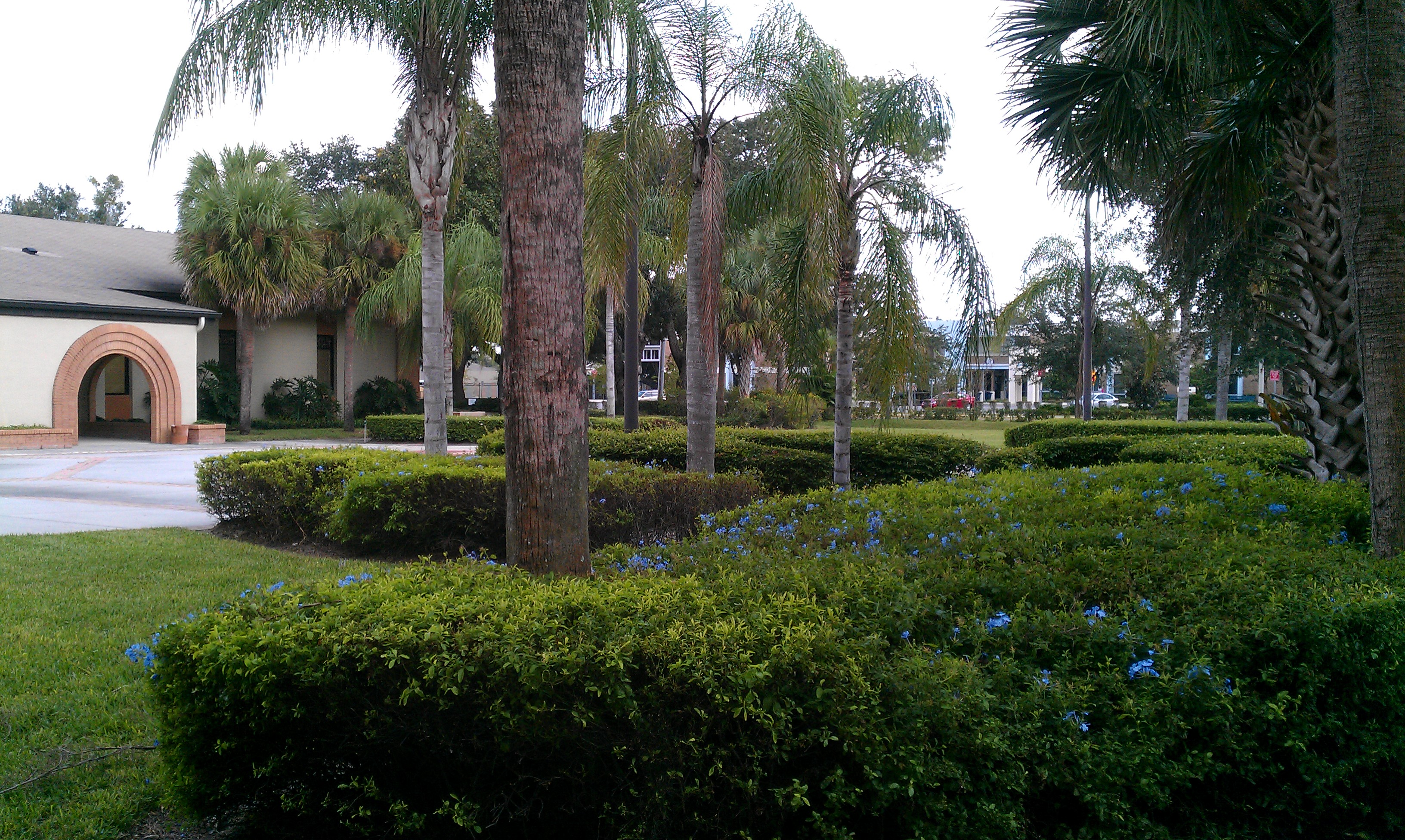 Set on ten acres that acts as a lush respite in its urban neighborhood, Blessed Trinity serves a diverse population of approximately 2.200 families. The parish includes a Hispanic ministry, an elder community, young families that continue to move into Orlando and join the parish. The extensive facility includes the original church, which now hosts a really beautiful memorial wall and whose interior serves as a center for religious education and faith formation.
Set on ten acres that acts as a lush respite in its urban neighborhood, Blessed Trinity serves a diverse population of approximately 2.200 families. The parish includes a Hispanic ministry, an elder community, young families that continue to move into Orlando and join the parish. The extensive facility includes the original church, which now hosts a really beautiful memorial wall and whose interior serves as a center for religious education and faith formation. 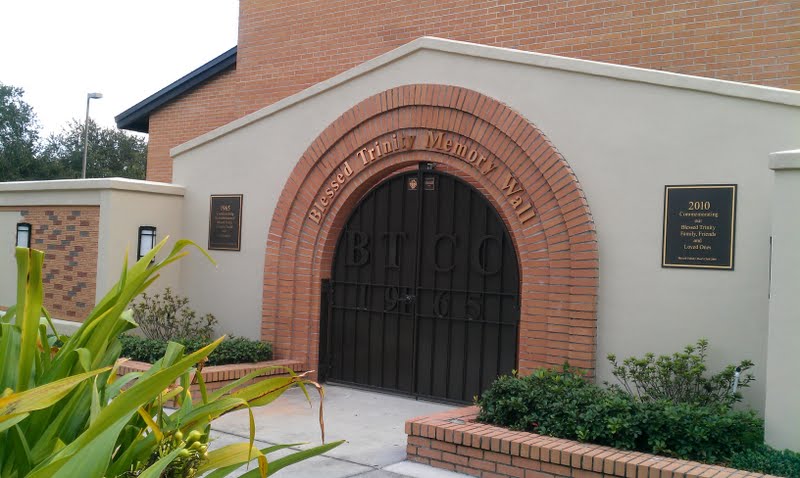
Memorial Wall
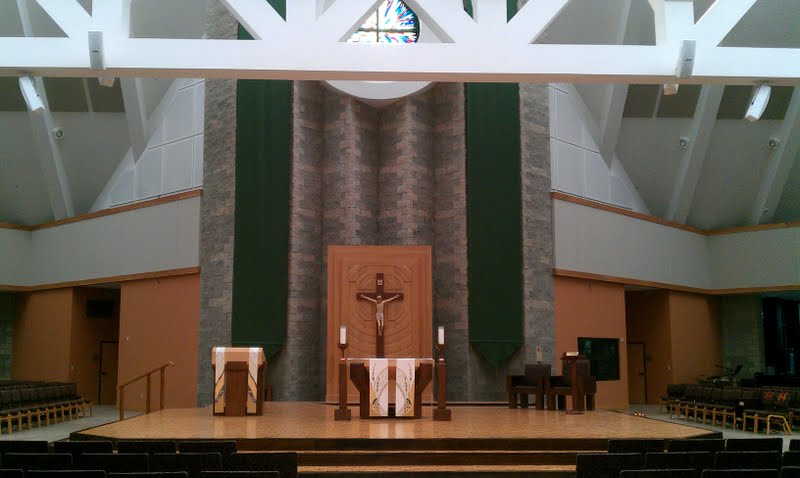 The principle church boasts two side chapels, spacious offices for the parish staff and volunteers, an entire house that serves as a thrift shop and operated by volunteers, as well as a robust liturgical ministry that includes several choirs, ministries of hospitality and art and environment. Faith formation includes a ministry of reconciliation for returning Catholics called "Welcome Home.' This parish is serious about building the body of Christ.
The principle church boasts two side chapels, spacious offices for the parish staff and volunteers, an entire house that serves as a thrift shop and operated by volunteers, as well as a robust liturgical ministry that includes several choirs, ministries of hospitality and art and environment. Faith formation includes a ministry of reconciliation for returning Catholics called "Welcome Home.' This parish is serious about building the body of Christ.
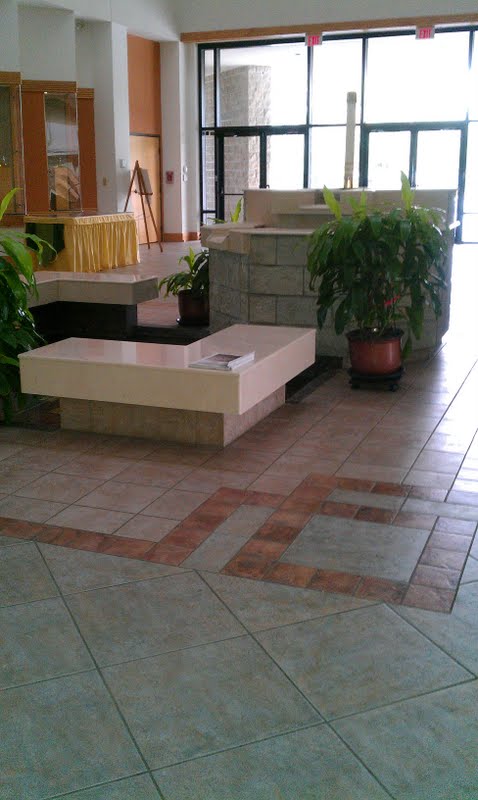 An immersion Baptism font and Paschal Candle (left) is the first encounter with symbol and sacrament as you enter the narthex at Blessed Trinity. A vibrant catechumenate for the Rite of Christian Initiation includes a catechumenate team and 22 catechumens.
An immersion Baptism font and Paschal Candle (left) is the first encounter with symbol and sacrament as you enter the narthex at Blessed Trinity. A vibrant catechumenate for the Rite of Christian Initiation includes a catechumenate team and 22 catechumens.
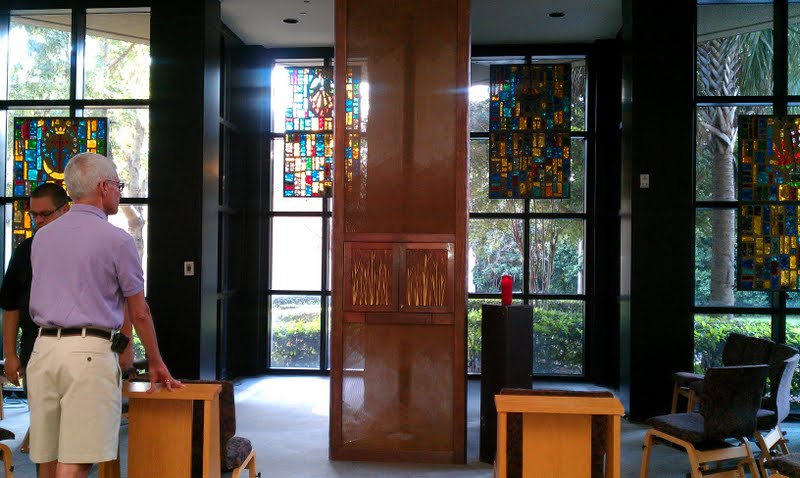
Separate repository chapel of the Blessed Sacrament
While we walked past one of the buildings, the Faith Formation administrator exited a door holding a box of items that appeared full of the usual 'church goodies' that you find on a clean-up detail after an event. After introductions, Carlos put the box down and said, "Let me give you a tour." We told him that we certainly didn't want to interrupt his work day but Carlos insisted that he was never too busy for people. “That's what we’re all about here. Paperwork can wait. People are our priority.” Okay, I thought; this guy is the real deal.
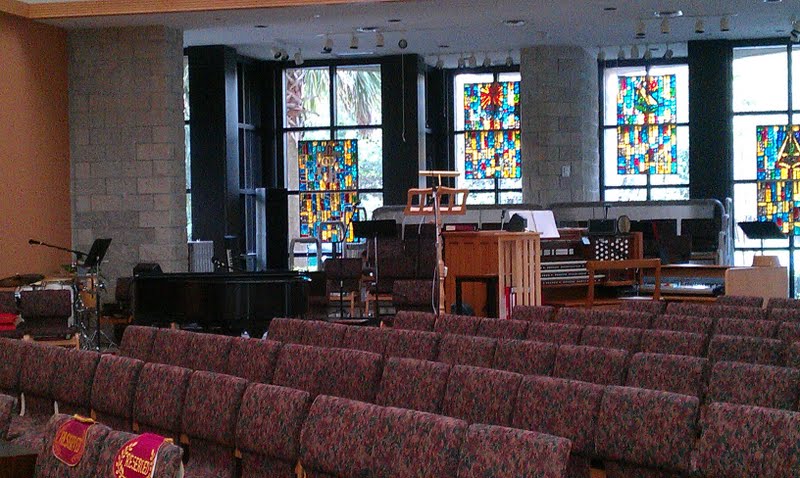 Carlos took us through many of the offices, multiple small chapels, meeting rooms and principle worship space, talking about the Blessed Trinity community, life in urban Orlando and his perspectives on a number of liturgical areas, including parish music. Pictured left is a Rodgers 3-manual organ, a Steinway grand piano, a drum kit, congas, a cello, choir section that serves both parish choir, youth choir and Hispanic music ministry.
Carlos took us through many of the offices, multiple small chapels, meeting rooms and principle worship space, talking about the Blessed Trinity community, life in urban Orlando and his perspectives on a number of liturgical areas, including parish music. Pictured left is a Rodgers 3-manual organ, a Steinway grand piano, a drum kit, congas, a cello, choir section that serves both parish choir, youth choir and Hispanic music ministry.
As Carlos spent an hour with us, I asked him how he came to be involved in faith formation and his work with the catechumenate at Blessed Trinity. "I worked for the Diocese of Orlando in the bishop's office for years," he said. "But you tend to feel a bit removed from people when you're not involved in parish life. I learned how to direct faith formation and about the catechumenate through the pastor's leadership. I drew knowledge and inspiration from the pastor's vision and from being with people who are searching for faith. The pastor leads well and works very collaboratively together with staff. Musicians, catechists, liturgical ministers, volunteers - we're busy here and happy that we're busy. More and more people are joining the parish all the time."
Carlos continued to say that some people are baptized and somehow stopped living sacramental life. They now want to continue their process of Christian Initiation because they have children and want to be fully initiated Catholics too. Others begin right at the beginning - as unbaptized persons who ask questions. They put their toe into the water before they take the big plunge into Christianity. That commitment changes a way of life and way of being.
Do I hear a shout out for Blessed Trinity? Here lives Christian hospitality that clearly welcomes everyone and creates a safe haven that is 'home' for anyone willing to encounter Christ. Thank you Carlos and to the pastoral staff and people of Blessed Trinity in Orlando, Florida for your Christian witness. Inspiring.
After our visit to Blessed Trinity, I started to reflect on the way the early Christians, how they were known by their charity for one another and their neighbors and the resounding appeal that drew others to Christ. Parishes who embrace the Rite of Christian Initiation in its fullest form model the early church for us in this post modern age. We may be in 2012 but the human heart longs for the same relationship with the living God now as in the past. How do we draw people into the heart of Christian faith?
Here's what The General Directory for Catechesis states about Christian initiation:
"Initiatory catechesis is thus the necessary link between missionary activity, which calls to faith, and pastoral activity, which continually nourishes the Christian community. This is not, therefore, an optional activity, but basic and fundamental... Without it, missionary activity lacks continuity and is sterile, while pastoral activity lacks roots and becomes superficial and confused: any misfortune could cause collapse of the entire building." No 64 cf also 91 (Statuta, Art. 6 §2
Further, the Directory goes on to say that
"Ongoing formation in the faith is directed not only to Christians individually, to accompany them on their journey towards holiness, but also to the Christian community as such so that it may mature also in its interior life of love of God and of the brethren, as well as in its openness to the world as missionary community." no 70 (Statuta, Art. 22 §1)
These two very strong declarations clearly place Christian Initiation front and center within the heart of parish life. If we build on anything less, we build our house on sand. The Rite of Christian Initiation not only serves people seeking faith; the process and involvement of the parish as the Church in mission transforms and strengthens it as matures in its own spiritual life. The work of Christian Initiation does not belong to leadership alone: it is the desire and duty of every baptized Christian as a work of evangelization from the source and summit from where we are sent - the Eucharist, to become the body of Christ for everyone.
That raises some questions that I pose here for your reflection.
Why is the Rite of Christian Initiation missing in action from so many parishes?
Does apathy or lack of initiative on the part of ordained and lay leadership restrain a parish from embracing this process?
Why do so many parishioners never have an opportunity to meet the faith seekers, inquirers and catechumens before they are baptized at the Easter Vigil? Why do our beloved elect, those whose faith we cherish that enriches us so deeply seem to just materialize out of the blue? What are their stories and where do we find God together as we encounter one another within sacred passage?
Why do so many parishes never experience the beauty and power of all of stages and rituals that create the entire rite of Christian Initiation? This rite contains the power to transform a parish into Christian dynamo on fire in service of the world. Why is the Rite of Christian Initiation so hidden when it clearly belongs front and center in parish life?
Come and meet some people who know and live this magnificent gift to the liturgical life of the church, the Rite of Christian Initiation. If you're part of a pastoral staff (including all you pastoral musicians!), you cannot afford to miss this conversation. If you're a parishioner an you want to deepen your understanding of the Church, you cannot afford to miss this conversation. If you're seeking life as a Christian, you REALLY cannot afford to miss this conversation and opportunity. We are the Church; everyone's welcome!
LIVING ROOM DIALOGUE
Monday, November 12,2012 at 7:00 pm
157 Stevenson Street, New Bedford, MA 02745
The Rite of Christian Initiation
the heart of evangelization
Presentors
Michael and Kathy Sites
with
Fr. Paul Caron
from St. Anthony/St. Rita Parish
Please RSVP by email to roncallicenter@gmail.com or call 508-982-3200. Bring a friend.
 Denise Morency Gannon
Denise Morency Gannon